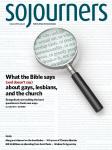2014 WAS NOTHING if not the year when implicit bias was exposed in law enforcement, the justice system, and media reporting. As the nation sorted out reporting on the police shooting of 18-year-old Michael Brown in Ferguson, Mo., police treatment of protesters, and the accuracy of the reporting itself, the words “implicit bias” or “unconscious bias” jumped to the fore again and again.
According to the Kirwan Institute report “State of the Science: Implicit Bias Review 2014,” “Implicit bias refers to the attitudes or stereotypes that affect our understanding, actions, and decisions in an unconscious manner.”
My question is this: If 2014 opened the eyes of the general public to the presence of implicit biases embedded in our systems, could 2015 be the year when we begin to take a closer look at the impacts of implicit bias in our public systems and structures—and the way we talk about them?
For example, take this tit-for-tat about the education system: On Oct. 11, in his third column in a series called “When Whites Just Don’t Get It,” Nick Kristof wrote in The New York Times, “Too many whites unquestioningly accept a system that disproportionately punishes blacks and that gives public schools serving disadvantaged children many fewer resources than those serving affluent children. We are not racists, but we accept a system that acts in racist ways.”
On Oct. 23, Norman Leahy and Paul Goldman posted their own op-ed in The Washington Post titled, “When ‘whites’ don’t get it—a rebuttal.”
Their direct “rebuttal” didn’t address Kristof’s point at all. Instead, they expressed deep offense that Kristof would paint all whites with the same big brush; they then proceeded to highlight one case of corruption by black legislators in one Southern town. If that’s not painting with a big brush, then what is?
Here is the implicit bias embedded in our education system—the bias Kristof referenced, the bias Leahy and Goldman completely missed: In our education system, schools are funded through local homeownership taxes. If an area has more homeowners, it will have more tax revenue to fund local public schools. The more homes are valued on the market, the more money residents will have for their schools. On the other hand, if there are more renters in an area, then there will be less money for the local schools.
Now consider this: Even after passage of the 1968 Fair Housing Act, housing discrimination happens. Realtors steer black families and other families of color to non-white areas with fewer resources and therefore lower property value. Plus, concentrated impoverished areas tend to have more renters. As a result, their schools have less money. Hence, many public schools in poor neighborhoods have no books and less-experienced teachers, often provided by an agency such as Teach for America. This is how our system works.
Worse, The Washington Post published Leahy and Goldman’s “rebuttal” as if it were a legitimate counterargument. It is one thing for a paper with the heft of the Post to engage a genuine dialogue. But the Post’s editors allowed a racially defensive and fact-evasive rant to masquerade as a legitimate rebuttal for the record. And, in the process, the paper laid another brick of implicit bias into the structure of our society. For years to come school children, university students, and researchers will look at the Post’s “rebuttal” and assume it is at least of equal weight to Kristof’s argument, and that it is legitimate logic—enough to be published in the paper that uncovered Watergate. But it is not. And that is the shame of it.

Got something to say about what you're reading? We value your feedback!
